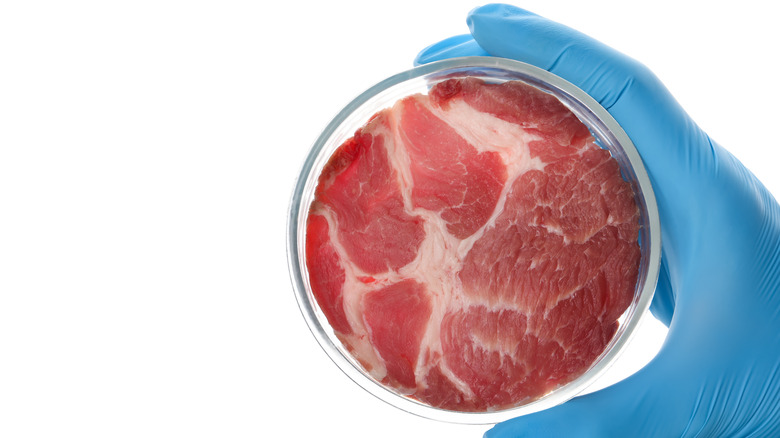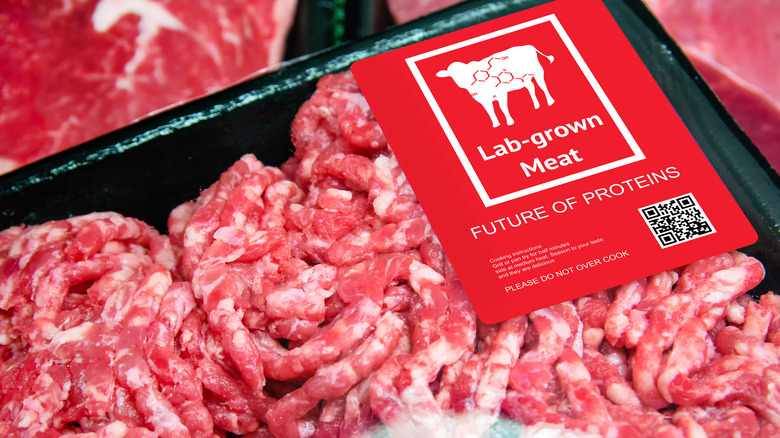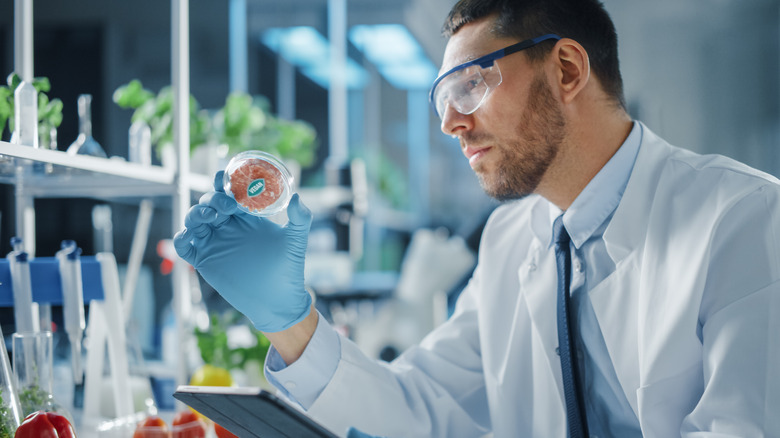Is Lab-Grown Meat The Future Of Food?
According to UC Davis, the cattle industry is "the No. 1 agricultural source of greenhouse gases worldwide." This fact is one of the reasons vegetarians don't eat meat and vegans don't eat any animal products. There are, of course, also ethical considerations when it comes to killing or exploiting other sentient beings for food.
Cellular agriculture, or the process of growing meat in a lab, could drastically change all that. By producing animal products like beef from cell cultures instead of live animals, this emerging field could alleviate some ethical concerns while also greatly reducing the ecological footprint from the production of cattle and other livestock.
That's good news for a growing global population that is also becoming more affluent, both factors that will increase protein demand around the world.
Some clarification: Lab-based meat isn't the same thing as plant-based meat alternatives such as those sold by Beyond Meat, Impossible Foods, Maple Leap Foods, ConAgra Foods, Morningstar Farms, and The Kroger Co. But both protein creations appeal to similar demographics, raising the question of whether lab-based meat might simply take over, especially as it becomes less expensive to produce.
How is lab-grown meat created?
As Isha Datar, executive director of cellular agriculture research institute New Harvest, explains in a TEDMonterey talk, the process starts with muscle, fat or connective tissue cells taken from a living animal — which might deter some vegans — which are attached to a "scaffolding material" that is placed in a "liquid medium" containing nutrients like carbohydrates and amino acids. The whole concoction grows in big stainless steel tanks called bioreactors that provide a stable environment for growing meat.
"Rather than raise a whole chicken with beaks, feathers, sentience, we grow the meat directly from muscle cells," Datar said. In addition to reducing emissions from livestock production, cellular agriculture can also save space and contribute to social justice.
"Ranching can't go vertical, but cell culture can," Datar added. "Suddenly, it becomes possible to choose to do things like restore the Amazon rainforest, which we continue to clear-cut for cattle, or revive other ecosystems that have been colonized by cows, corn and soy. Or return stolen lands to Indigenous peoples, who can finally reclaim their ancestral foodways."
Should Beyond Meat be worried?
So, should companies like Beyond Meat and Impossible Foods worry about lab-based meat putting them out of business? After all, BIS Research forecasts the global cultured meat market will see an annual growth of nearly 35% from 2026 to 2030, by which time it will reach more than $94 billion.
Rhian Hunt, a writer for the Motley Fool, doesn't think so. "Cultured meat's rise to dominance, as predicted by some analysts, seems a somewhat improbable scenario," he argues. "Plant-based meats got there first, offer the same eating experience, and lack some of cultured meats' lingering downsides."
In Hunt's opinion, plant-based meat producers will still be able to sell their products alongside proteins made with cellular agriculture. "And if its upsurge appears strong enough," he writes, "they may have the cash on hand to simply acquire some of the best new brands and use their existing infrastructure to turn them into an even bigger success." As lab-grown meat is still in its early stages, only time will tell what the future of the industry will look like.


